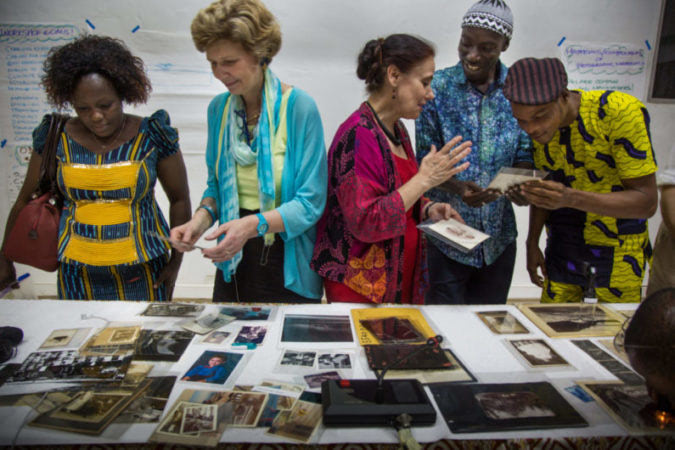Photography collections across Africa – 19th-century albumen images, silver gelatin black-and-white prints, glass plate and film-base negatives, contemporary color, and digital media – provide a vibrant cultural and archival resource to their local societies. When preserved and made accessible via traditional media platforms, these images have the capacity to improve visual literacy, enhance local history programming, engage communities, and strengthen regional conflict resolution.
In Africa, important and often large photograph collections face growing environmental and economic danger. Many are held privately or housed in regional museums and libraries where controlled environments are rare and damage caused by flash floods, silverfish, termites, and mold is widespread. Increases in international sale and theft pose new and formidable threats. Sustainable, site-specific, and technology-appropriate collections care solutions are required.
The Centre de Recherche et de Documentation du Sénégal, a museum, library, and photograph archive in Saint-Louis, Senegal, has made a significant impact on photograph preservation practice throughout the region. Likewise, the impressive École du Patrimoine Africain (ÉPA) in Porto Novo, Benin, provides sound training and education in museum practice for 26 francophone and lusophone countries of West Africa.
Despite the good work of both institutions, more photograph preservation training across sub-Saharan Africa is needed urgently! In response, the PA partnered with Resolution Photo, the Department of Art Conservation at the University of Delaware, the Centre de Recherche sur la Conservation in Paris, and Photograph Conservation at The Metropolitan Museum of Art in New York, collaborating to identify important photographic repositories at risk and to develop, organize, and administer a four-day Photograph Preservation Workshop held in Benin in April 2014.
Imagined as the first phase of a much larger initiative called 3PA or Prservation du Patrimoine Photographique Africain, this workshop included 24 established curators, photographers, collection care professionals, and directors of contemporary art centers, museums and regional archives deeply committed to the preservation of African heritage in Africa. Well over 50% of the participants were talented artists/photographers who care for influential archives, including those representing the collections of Roger DaSilva of Senegal, Alioune Bâ and Adama Bamba of Mali, and J.D.’Okhai Ojeikere of Nigeria, all photographers of historic and cultural significance. Their repositories include stunning portraits, landscapes, and community celebrations.


Core lectures and hands-on demonstrations were taught by Bertrand Lavédrine (Centre de Recherche sur la Conservation des Collections, Paris, France), Debra Hess Norris (University of Delaware Department of Art Conservation), and Nora W. Kennedy (Photograph Conservation at The Metropolitan Museum of Art). Addressing topics ranging from the identification of negative and print processes and creative storage solutions, to advocacy and grant writing, the workshop stimulated compelling contributions from all quarters. Teaching was hands-on where possible and translated simultaneously to ease communication.
Additional discussions were led by Fatima Fall (director of the Centre de Recherche et de Documentation du Sénégal museum, library, and photographic archive in Saint-Louis, Senegal); Henrike Grohs (director of the Goethe-Institut in Abidjan, Côte d’Ivoire), Franck Ogou (curator, cultural producer, and cultural heritage manager at the École du Patrimoine Africain in Porto-Novo, Benin); and Erin Haney and Jennifer Bajorek (co-directors of Resolution Photo and organizing partners). These speakers addressed diverse issues related to public programming, community outreach, advocacy, intellectual property, and digitization. Some of the most exciting brainstorming sessions focused on the use of traditional clay and earthen architecture to provide passive cooling and ventilation and opportunities to connect independent photographic archives across borders.
African participants spoke eloquently and with passion about the preservation of these rich photographic resources. While great strides have been made in the preservation of photography in Africa, the broadening of networks and further dissemination of information as a result of this workshop are further steps in connecting and empowering talented African archivists, artists, collection care professionals, directors, and educators capable of advancing preservation practice, public programming, and advocacy. This work must continue through additional programming, online mentoring, and an investment of new preservation funding for collections at risk. A workshop at the Zimbabwe Art Gallery is planned for 2015 once funding is secured.
Tru Vue Inc. donated to this initiative, along with other funders, including: L’École du Patrimoine Africain, the University of Delaware Department of Art Conservation and Institute for Global Studies, The Metropolitan Museum of Art, the Centre de Recherche sur la Conservation des Collections, the Goethe-Institut Abidjan, the Center for Research and Restoration of the Museums of France, University Products, the Getty Conservation Institute, the American Institute for Conservation Photographic Materials Group, The Better Image, and other individual donors, all demonstrating their profound support for collections preservation in underserved regions of the world.
Share this Article:
This article is intended for educational purposes only and does not replace independent professional judgment. Statements of fact and opinions expressed are those of the author(s) individually and, unless expressly stated to the contrary, are not the opinion or position of Tru Vue or its employees. Tru Vue does not endorse or approve, and assumes no responsibility for, the content, accuracy or completeness of the information presented.
